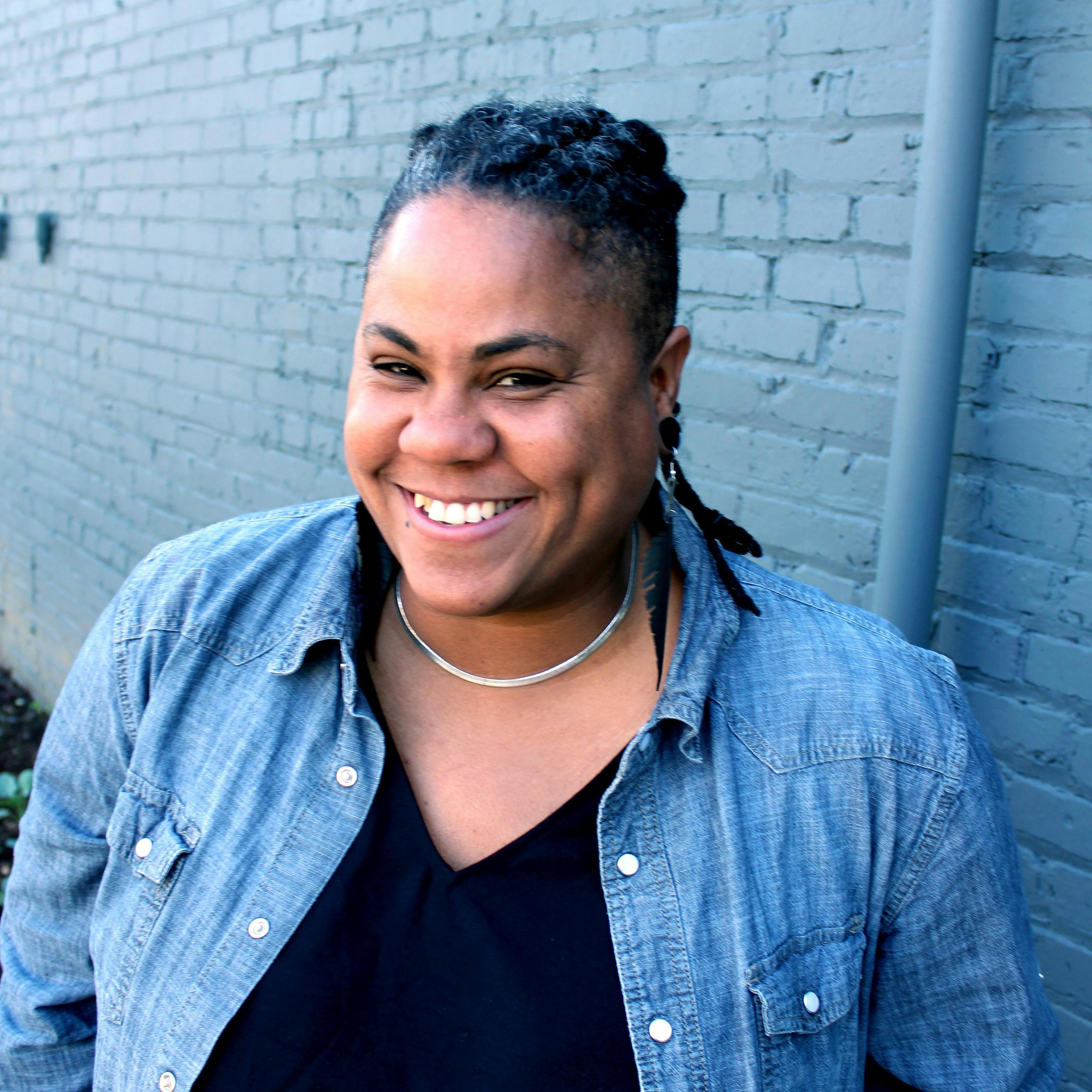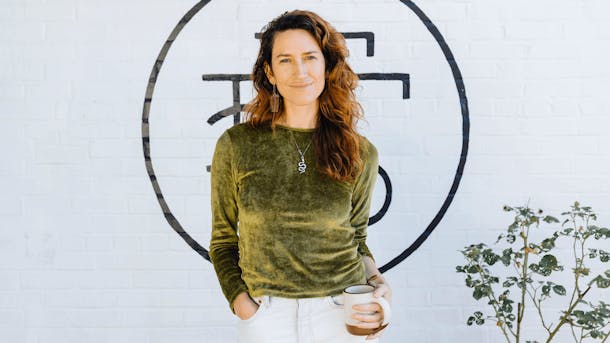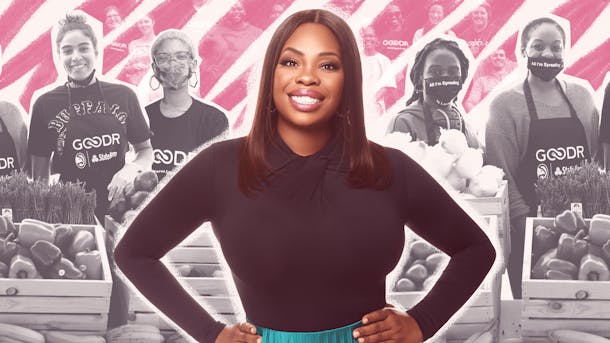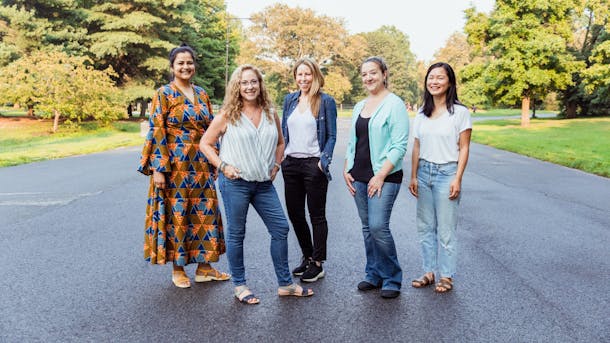
Feature Story
Brewing a better beer industry
These three trailblazing founders and organizations are transforming the beer world into a more inclusive, diverse, and equitable industry for everyone.
Throughout the U.S. (and beyond), beer has long been associated with a certain type of person: white, straight, and male. But women, people of color, and LGBTQ+ folks have taken plenty of seats at taproom tables — and have worked behind the scenes to help produce the beers that are poured, from hazy IPAs to complex sours.
Still, there has historically been a marked gap in representation in the beer world — and a shortage of impactful diversity, equity, and inclusion (DEI) efforts. Despite an undeniable craft beer boom (in the U.S. alone, there are now close to 9,000 breweries) and a consumer base that’s rapidly diversifying, only 0.4% of breweries are Black-owned and only 23.7% are woman-owned, for instance.
We spoke to three founders of breweries and organizations committed to social change: Weathered Souls Brewing Co., The Queer Brewing Project, and Crafted For All. From how these trailblazers fell in love with beer to how they’re focused on great beer and meaningful change today, these stories shed light on what it takes (and will continue to take) to build a better, more inclusive beer industry.
The Texas brewery that’s producing bold beer while taking on injustice
Marcus Baskerville has a personal drive to succeed in the beer world. “Being a minority in the industry and being the prideful person that I am, I’ve always carried a chip on my shoulder, I guess,” he said. “It’s driven me to want to continue in the industry — to continue to grow, to continue to learn.”
In many ways, he has already succeeded. Weathered Souls Brewing Co., which he co-founded in 2016 in San Antonio, Texas and where he is head brewer, has won numerous accolades — including being named one of the best craft breweries in the country by Hop Culture. To boot, Marcus has been nationally recognized for using his platform as a founder and leader in the craft beer space to promote social justice causes and inspire lasting change.
But, despite these huge early successes, it also feels like Marcus’ journey has just begun.
Being a minority in the industry and being the prideful person that I am, I’ve always carried a chip on my shoulder. It’s driven me to want to continue in the industry — to continue to grow, to continue to learn.
Changing state, career, and the local beer scene
Marcus wasn’t always a beer fan — in fact, he used to prefer spirits. That changed when his brother introduced him to the Southern California beer scene during his 20s; a burgeoning interest in all things beer quickly followed. The brothers started homebrewing together, and the early results were mediocre at best: “It wasn’t terrible. But it wasn’t great, either,” Marcus said.
In 2013, Marcus moved to San Antonio to take a job in fraud investigation with Citibank, but one week after he moved to Texas, he was involved in a car accident that would change his trajectory. A settlement from that accident spurred him to scale up the quality of his brewing equipment and his output, leading to a deeper devotion to his craft.
As he invested in his passion, he was inspired by a pivotal moment in the homebrewing community that same year. Annie Johnson, a Black homebrewer from Marcus’ hometown of Sacramento, California, won the American Homebrewers Association’s Homebrewer of the Year award — the first ever Black brewer to do so. “Seeing somebody who looked exactly like me — and was from my hometown! — reach the epitome of homebrewing lit a fire under my ass. I was like, ‘If she can do this shit, I can do it too!’”
Marcus did do it — he improved his brewing game, won gold medals in homebrew competitions for his flavorsome beers (which included orange creamsicle IPAs and stouts with maple), and took on a part-time assistant brewer job at San Antonio brewery Busted Sandal after all his beers sold out in one night during a tap takeover — all while he was still working full time at Citibank.
By early 2015, Marcus recognized that he wanted more freedom and autonomy as a brewer, and he made the decision to leave Busted Sandal. Shortly afterward, he met up for drinks with Mike Holt, a friend and a fan of his homebrews who was also an investor in Busted Sandal. When Marcus casually asked Mike about opening up a brewery, Mike responded, “I’ve been waiting for you to ask me that.” They started working on the business plan for Weathered Souls Brewing Co. eight days later.
Weathered Souls developed a faithful following early on, filling a gap in the San Antonio craft beer market by offering fresh, unique styles like pastry stouts and fruited sours. In early 2017, Marcus left Citibank and committed to brewing full time.
Using beer to prompt awareness and change
While Weathered Souls has been successful in its own right, Marcus’ Black Is Beautiful initiative propelled the brewery — and Marcus himself — into the national spotlight.
Launched to draw attention to the daily injustices that people of color face, Black Is Beautiful was inspired by Marcus’ response to the murders of George Floyd, Breonna Taylor, and countless other Black Americans. “I’ve gone through police brutality and racial discrimination myself,” he said. “You look at those things, and it’s like, ‘Damn, that could be me. Or my brother, or my wife, or my daughter.’”
His desire to create awareness and drive education and change gave Marcus the idea to offer other breweries the opportunity to use Weathered Souls’ stout recipe, which they could alter if they wished, to brew and sell beer to benefit social justice causes. Initially, he thought one or two hundred breweries would opt in, but over 1,300 breweries have collaborated to date, with donated proceeds from the stout totaling around $3 million and generating nationwide press from various news outlets like ABC, CBS, and NPR.
A brighter future inspired by the past
With the success of Black Is Beautiful — now in its second year — Marcus has plans for another DEI-oriented project: “After seeing the success of Black Is Beautiful, I thought, ‘What's next?’”
What’s next, it turns out, is a significant commitment to supporting women and other underrepresented groups in the craft beer industry. In 2022, Weathered Souls will open their second brewery in Charlotte, North Carolina — which will also include an incubator space for women and people of color who want to break into the craft beer world.
“Many women and minorities don't have the financial means to get a brick-and-mortar space,” Marcus said. “They also don't have the relationships to be able to navigate the industry or to access the resources they actually need to go ahead and open. What I want to do is bridge that gap.”
The Weathered Souls incubator in Charlotte will not only provide space and materials — like hops and yeast — for aspiring brewers to craft beer of their own, but brewing education, too. “You’re going to come and get those advantages of running through a malting program, a hop program, yeast propagation — all of those things that, when I first got into the industry, I didn't have available to me.”
The name of the incubator — The Harriet Baskerville Incubation program — pays homage to Marcus’ 93-year-old grandmother. Harriet used to brew hooch with her father during prohibition — until a white man repairing the family’s roof pestered her to try some, got tipsy, and fell off the roof.
“That doesn't look very good, especially in Topeka, Kansas,” Marcus said. “She prayed to the Lord and vowed that if the police didn't come, she’d never make anything again.” The police never showed up, and Harriet hasn’t produced — or touched — alcohol since, Marcus said. But, he added, she’s proud of her grandson’s success, especially the Black Is Beautiful initiative and the upcoming incubator that will help usher in new and diverse brewers.
Marcus’ hopes for his brewery — and the beer industry
Looking beyond his current projects, Marcus sees continued opportunity for Weathered Souls to grow as a brand known for quality brews. He hopes to continue to develop his own role as a founder and a brewer, potentially taking on the role of brewing director and focusing his efforts on the business’ growth.
He also hopes to see growth in the craft beer industry’s approach to diversity, with more people of color and women in positions of power. “That’s the only way anything is going to really change within the industry,” he said.
While there’s no question that transforming an entire industry into one that’s more inclusive, equitable, and diverse requires a sustained effort from many people, Marcus carries a tangible sense of hope that the beer industry will someday reflect his vision for change.
The brewing project providing visibility for LGBTQ+ people
“I’ve dealt with homophobia and transphobia in much the same way that every queer or trans person I know in the beer world has,” said Lily Waite, a queer trans woman and the founder of The Queer Brewing Project. “Some of it was simply due to ignorance, some more overtly antagonistic or malicious.”
Lily, who’s based in the U.K., launched The Queer Brewing Project in 2019 to provide visibility for LGBTQ+ folks in and around beer, to build community, to advocate for LGBTQ+ rights, and to raise funds for LGBTQ+-oriented charities that are doing crucial work on the ground.
Within the space of two years, Queer Brewing has brewed incredible beer, collaborated with revered breweries, and raised over $40,000 for LGBTQ+-aligned charities, among many other impressive feats — and they’re showing no sign of stopping any time soon.
Collaboration has been fundamental
“I fell into the beer industry almost by happenstance,” Lily said. Her journey began while working at Greene King, a large pub retailer and brewery in the U.K., when she was an art student. When her manager left to open a craft beer bar nearby, Lily followed — and was introduced to a new world.
From that introduction, Lily’s interest in beer led her to work at numerous distributors after she graduated before ultimately joining We Are Beer, the team behind the London Craft Beer Festival, to run their social media and write for their website. In 2019, Lily joined the Good Beer Hunting team as a beer writer.
That same year, Lily launched The Queer Brewing Project as a side gig, tapping into her network to create a community of like-minded folks interested in collaboratively producing beer. “I spent a lot of time getting in touch with people I knew personally at breweries — I’d been kicking around the U.K. beer scene for a couple of years at that point and had forged relationships through my writing work so I was connected with vast swathes of the industry,” she said.
As she made connections, collaborations typically involved producing a one-of-a-kind beer with an established brewery, which would then be sold to craft beer lovers either in aid of an LGBTQ+-focused cause or for the benefit of a charity that aligned with Queer Brewing’s mission.
After the first collaborations generated a buzz, breweries began to reach out to Lily, which caught her a little by surprise. “I’d initially envisioned maybe doing one collab a month, but by the end of the first year I’d done 25 or so, including several in the U.S. and in Scandinavia,” she said.
But with Queer Brewing being neither fully a business nor a charity, securing the finances to collaborate and produce the beers was tough — especially on a writer’s salary. Luckily, folks from the beer community supported Queer Brewing via Patreon — a membership platform where patrons (customers, supporters, fans) can pay a monthly fee to support a creator or organization and receive items or benefits in return. “The support I received initially — and continue to receive, might I add — was phenomenal. Without it I don’t know that finding the balance between paid work and Queer Brewing would have been possible.”
Visibility and representation at scale
Now, two years on, Queer Brewing has become a beer brand and a brewery in its own right, helping to further shine a light on LGBTQ+ folks.
Most recently, the project released their Fight Like Hell DIPA, a beer that “is one of the most meaningful we’ve ever brewed, if not the most,” Lily wrote on the Queer Brewing blog. Fight Like Hell was brewed to observe Trans Day of Remembrance on November 20th, an annual day to honor and remember those who have lost their lives to anti-trans violence.
Despite the focus on brewing their own line, Queer Brewing isn’t halting collaborations. In fact, a recent collaborative effort with Cloudwater Brew Co. led to the development of the Beer with Big Ideas four-pack, featuring beers from Queer Brewing and three minority-owned breweries (Good Karma Beer Co., Eko Brewery, and Rock Leopard Brewing Co.), which has been stocked by 470 branches of U.K. grocery chain Tesco since April.
Having the word “queer” on a product being sold in such a large consumer setting is a definite win for Queer Brewing, as Lily wrote: “Not only are we putting great beer in front of different communities, we’re also providing visibility and representation on a bigger scale than we’ve ever worked at before.”
As Queer Brewing continues to grow and thrive, Lily has been able to bring on two fellow part-time staff members — one of whom is her partner, Charlotte, who’s primarily in charge of design. With the additional help, Lily said, they’re in a good place to work toward long-term goals.
“The plan is to open our own [brick-and-mortar] brewery at some point,” Lily said. “We’re also working (slowly, unfortunately, given none of us work full-time for Queer Brewing) on the Queer Brewing Foundation, which will provide open-source and free resources for the industry and provide small scholarships for LGBTQ+ people looking to learn more about beer and cider as a route into the industry.”
The impact of the visibility and representation that Queer Brewing has brought forth is tangible — Lily has received many messages over the last two years from LGBTQ+ folks who feel seen, recognized, or included in the craft beer space thanks to their work to make the beer industry a safer, more welcoming place for LGBTQ+ brewers and beer drinkers alike.
The organization empowering beverage producers to be more inclusive and equitable
Crafted For All — founded by Dr. J Jackson-Beckham, a Black, queer woman — has a clear mission: to help breweries and other beverage producers drive success, inspire individuals, and build community through inclusive, equitable, and just practices. Rather than driving awareness themselves, they’re doing what they call the infrastructural “dirty work” — from helping producers write standard operating procedures to providing DEI surveying and diagnostic tools — so all who are employed by beverage producers can thrive.
“There are a lot of DEI practitioners who focus on bringing awareness and generating visibility. Those things are extremely important — and we need those people. But I've also realized I'm not good at that,” said Dr. J.

What I tell people is, ‘I'm the plumber. I will be under the house working on the pipes.’ Nobody will walk in and say, ‘Oh my gosh, your pipes are awesome!’ But you will have running water and flushing toilets every day.
Such important work takes time, though — just as it’s taken time for Virginia-based Dr. J to land on the current iteration of her mission-led organization.
From taproom to classroom
For Dr. J, working behind taproom bars and at homebrew supply stores was meant to be a way to earn cash as a college student. However, as with Lily, a love for beer quickly transformed a practical occupation into a passion. As she became more deeply involved in the beverage space, she realized that the places she frequented — like festivals, tastings, and bars — were markedly white and male. “I went to many beer events where I was not only the only person of color, but also the only woman,” she said.
By the time she began her Ph.D. at the University of North Carolina in 2007, she was a self-described “beer geek.” She leaned into her passion, opting to focus her academic work on the American post-prohibition beer industry. After earning her doctorate, Dr. J became a communication studies professor.
In 2017, when the North Carolina Craft Brewers Guild invited Dr. J to speak at an event, she caught the attention of a representative from the Brewers Association who was in attendance. A couple of months later, she was hired to serve as the association's Diversity Ambassador for its newly-launched Diversity Committee. In her contract role with the association, she operated under the consultancy name Craft Beer For All, providing educational DEI content and undertaking research related to diversity and inclusion in the industry.
Pivoting, then pivoting again
After consulting with the Brewers Association for two years, Dr. J made the tough decision to leave a tenure-track faculty appointment and focus her career on serving the beer industry full time. Having fully committed to her new path in summer 2019, she was forced to pivot again in March 2020, when the pandemic changed everything.
“[All of my work] had been either on-site consulting or public-speaking at events — and everything got canceled,” she said. The sudden change forced Dr. J to go back to square one with Craft Beer For All. “I just had to push reset and say, ‘Okay, let's start over. What do people need?’ I really struggled to figure out how to move forward. But then, at the beginning of June, George Floyd was murdered.”
In the aftermath of that event and the subsequent growing awareness of the injustice experienced by countless Black and brown people in the U.S., companies rushed to act. They sought out DEI firms and practitioners to help them improve their operating practices, create success pathways for applicants and employees, and implement better post-hire initiatives to retain and support diverse talent. Dr. J’s position at the intersection of DEI and beer quickly propelled her to a prominent role in the industry.
“All of a sudden I went from thinking, ‘I might have to go down to the hardware store and get a job to feed the family,’ to recognizing, ‘Everyone is calling me because they’ve realized they need some anti-racism education,’” she said. A rebrand of her business — from Craft Beer For All to Crafted For All — soon followed, allowing her to work not just with breweries but with craft wine, cider, and other beverage producers, too.
An industry that’s better — for everybody
Over a year later, Crafted For All is now a three-person team helping those in the beverage industry rebuild their infrastructure and instill inclusive, equitable practices. They provide beverage producers the information and assistance they need to make meaningful changes — from redeveloping their approach to employee promotions to achieving B Corp certification.
The main point of entry to the organization’s offerings is through Patreon, where subscribers can select various tiers of membership. For instance, people subscribing to Crafted For All’s “Barrel Program,” their most comprehensive tier out of four, are provided benefits like exclusive downloadable DEI resources, free training, and the option to participate in ongoing discussions about beverage industry topics with others in the industry.
The organization’s Crafted For All commitment, a pledge that businesses can take to drive inclusive, equitable, and just behaviors, is available to any company, without a membership or associated fees. While it’s not particularly glamorous, the internal deep-level work outlined in the commitment is a crucial approach to positively altering a company’s infrastructure.
As Dr. J said, “If you bring a whole slew of brown and Black people and women and queer folks and people living with disabilities into the industry but don't have the infrastructure to make sure that they have an equitable experience or that they’re adequately supported or that their lives are respected and valued, then you've not accomplished very much. You've created a horrible experience for people who have conditions of difference.”
Small- and large-scale companies have taken note of the impact of the pledge, with brewers such as New Belgium Brewing and Dogfish Head, along with many smaller operators, signing the commitment to date.
In terms of next steps, Crafted For All is focused on creating more educational content for beverage producers. And while she hasn’t quite figured out the logistics, Dr. J wants to build a more robust network of DEI practitioners in the industry through training or actionable resources. The current number of people who have both change management skills for DEI and intimate knowledge of the beer and beverage industry are few and far between, and Dr. J has found herself bearing what she fears is an unsustainable load. “I’m exhausted. I've experienced some trauma as a result of the work,” she said. “I love it, and I continue to do it every day, but there needs to be more people like me.”
Despite her own fatigue and the ongoing need for innovation and improvement around DEI in the industry, Dr. J is optimistic that there’s a better future ahead for the industry at large. “I think we have a lot of resilience as an industry and we have a lot of people who are willing to move forward. We just need to provide the right environment so people can make the right decisions and create bright environments themselves. That's why we're here, giving people the tools they need — and I think the sky's the limit.”
A hoppier future
The beer world is full of proactive makers and doers — it’s also an industry with experimentation and innovation at its heart. While meaningful industry-wide changes certainly don’t happen quickly, thanks to the likes of Weathered Souls Brewing Co., The Queer Brewing Project, Crafted For All, and the many organizations committing themselves to action, an industry that’s better for everybody is brewing.



